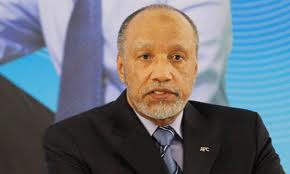By Andrew Warshaw, chief correspondent
June 3 – UEFA chief Michel Platini rejected a request by Mohamed bin Hammam to take on Sepp Blatter in 2011 for the presidency of FIFA, INSIDEworldfootball has learned. High-ranking UEFA sources have confirmed that Platini held “a number of informal discussions” with bin Hammam shortly before the December 2010, vote for the 2018 and 2022 World Cups but that these were solely about the presidency and nothing to do, as has been claimed, with the ballot.
Platini is understood to have told the Qatari construction magnate he would prefer to carry on running European football for the time being.
It was at that point that bin Hammam, who at the time was head of the Asian Football Confederation and, like Platini, a FIFA vice-president, decided to take on Blatter himself, only to be subsequently banned for life following the infamous cash-for-votes scandal in the Caribbean, having the sentence overturned by the Court of Arbitration for Sport, then being later banned again, this time for financial mismanagement whilst in charge of Asian football.
Last weekend the Sunday Times produced a detailed 11-page expose of alleged corruption by bin Hammam, linking financial handouts to over 30 presidents of African federations to wrongdoing by Qatar’s 2022 bid team.
The revelations prompted a stream of reaction, not only from among Qatar’s beaten adversaries but also by Lord Peter Goldsmith, a former member of the Independent Governance Committee set up by FIFA who said it was the organisation’s “last chance” to show true reform. “I believe that if these allegations are shown to be true, then the hosting decision for Qatar has to be rerun,” he told the BBC.
Platini, who has openly admitted he voted for Qatar, was subsequently drawn into the debacle when it was reported by another British newspaper that he held several private meetings with bin Hammam right around the time of the 2018 and 2022 ballots. But INSIDEworldfootball has been told none of these focussed on the vote.
One UEFA source close to Platini said: “Bin Hammam tried several times tried to convince Platini to run against Blatter. He needed to know Platini’s intention. Once he realised Platini was not interested, bin Hammam decided to go it alone.”
“Of course the pair of them used to meet. After all, they were part of the same FIFA executive committee and stayed in the same hotels. But Qatar 2022 was never on bin Hammam’s mind. He was entirely focused on his own candidacy. The discussions never once focused on the World Cup.”
Qatar has insisted that bin Hammam never “officially or unofficially” acted on behalf of the bid (http://www.insideworldfootball.com/andrew-warshaw/14763-andrew-warshaw-smoking-gun-but-where-does-it-really-point-us), a declaration that seems bound to form part of the eagerly awaited report by FIFA’s ethics committee investigator Michael Garcia into the entire bidding process.
Garcia was understood to be meeting Qatari officials for a second day in Oman today before completing his inquiries on June 9, 24 hours before the FIFA Congress in Sao Paulo, and submitting his report around six weeks later to the committee’s adjudicatory panel which will then decide whether to recommending punishing anyone involved in the process.
Whilst it may seem implausible to some that Qatar’s most influential football official at the time played no part in their World Cup bid, it has been widely rumoured that the Qatari authorities themselves were uncomfortable with bin Hammam’s bid for power and that it was a hindrance to the 2022 bid. “They saw his presidency as an obstacle for the Qatari bid,” one insider said.
The whole saga surrounding the December 2010 ballot is all about who is telling the truth and whether any actual rules were broken. INSIDEworldfootball has also been told that the African federations who were apparently lavished with hospitality by bin Hammam had little or nothing to do with influencing the votes of their four African colleagues on the executive committee, who may anyway well have not voted as a bloc. “The (voting) African guys on the executive committee are not influenced by member associations, even in their own Continent,” another source revealed.
As momentum builds on FIFA to re-run the 2022 vote – a highly unlikely scenario unless Garcia finds concrete evidence of corruption by those directly involved – FIFA vice-president Issa Hayatou branded claims he received bribes in exchange for voting for Qatar as “ridiculous”.
Hayatou, the long-serving president of the African Football Confederation (CAF), was one of those identified in the Sunday Times probe and was infamously reprimanded by the International Olympic Committee (IOC) three years ago for receiving FFr100,000 from FIFA’s scandal-ridden former marketing agency International Sport and Leisure.
It is no secret that Qatar’s bid committee sponsored CAF’s annual congress in Angola in 2010 as part of its expensive bid campaign. The grey area of whether such a move violated FIFA’s code of ethics by exerting undue influence on voting executive committee members is exactly the kind of thing Garcia will be looking at as he draws up his report.
In a statement CAF insisted the latest allegations against Hayatou were wide of the mark. “The CAF President never attended events from invitations of Mr Bin Hammam either in Doha or Kuala Lumpur,” it said. “Mr Hayatou has never received any money from Mr Bin Hammam, the Emir of Qatar or any member of the Qatar 2022 Bidding Committee.”
Contact the writer of this story at moc.l1744970789labto1744970789ofdlr1744970789owedi1744970789sni@w1744970789ahsra1744970789w.wer1744970789dna1744970789

